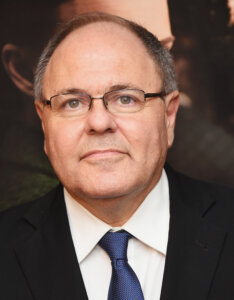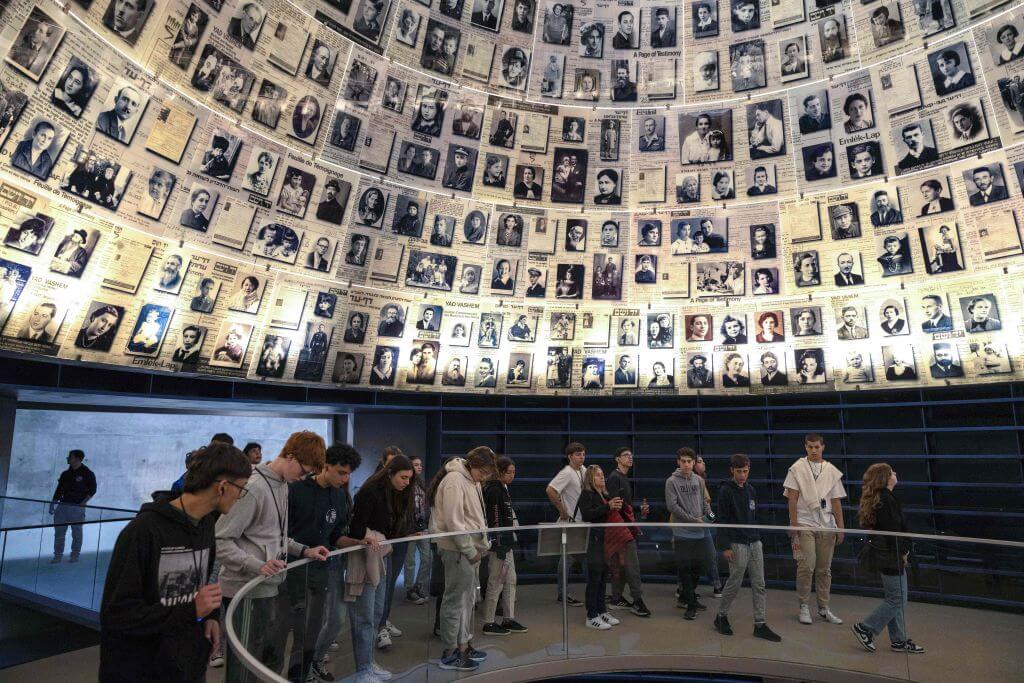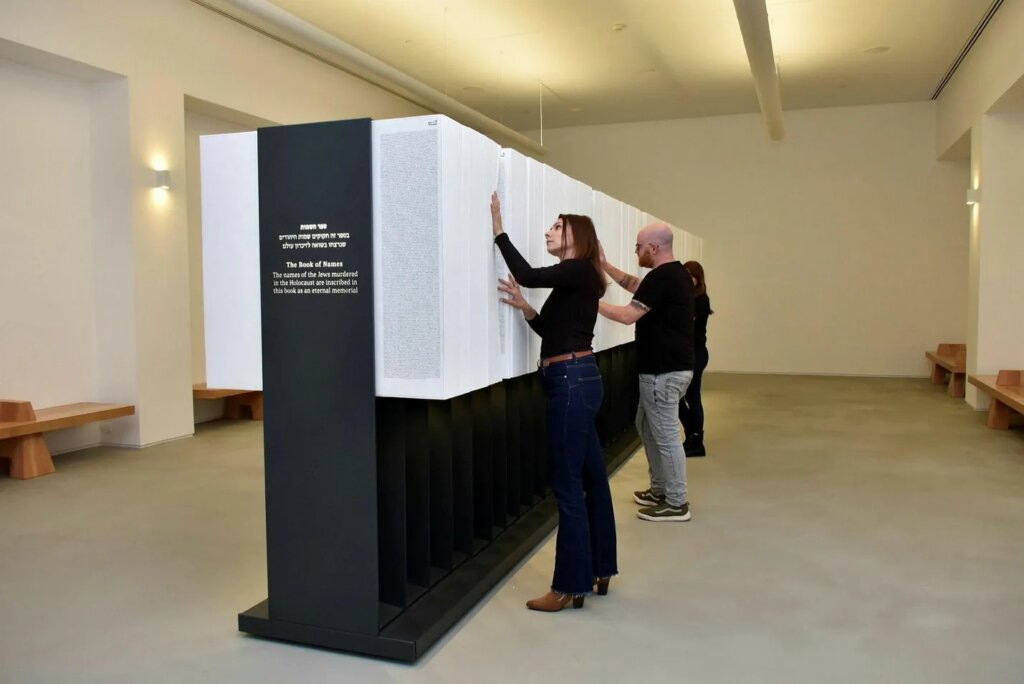‘Happy hour’ for Holocaust deniers? Yad Vashem chief anticipates the death of the last survivor.
In a wide-ranging conversation, Dani Dayan denounced recent incidents in Poland, weighed in on the new U.S. plan to combat antisemitism and discussed the ‘post-survivor’ era

A view of the main gate of Auschwitz on January 26, 2023 Photo by Omar Marques/Getty Images
The chairman of Yad Vashem decried the stifling of a Holocaust scholar in Poland this week as “a new low” in attempts to suppress discussion about the complicity of Poles in the persecution and murder of Jews.

In a wide-ranging phone interview with the Forward Thursday, Dani Dayan also critiqued a video posted this week by Poland’s ruling party that he said wrongfully invoked images of Auschwitz. And he spoke about the new U.S. plan to combat antisemitism and the challenge of teaching about the Holocaust once its survivors have all passed away.
But Dayan’s concerns focused on Poland this week. A right-wing member of the Polish parliament on Tuesday grabbed the microphone as Polish-Canadian historian Jan Grabowski was about to deliver a lecture in Warsaw, and smashed it against the podium as he knocked over loudspeakers. The lecture did not happen.
“This act of vandalism is more than an ugly attack on an internationally renowned scholar. It is an attack on academic freedom, on the historical record, and on Holocaust remembrance,” Dayan said in a statement.
The lawmaker, Grzegorz Braun, has a history of making antisemitic statements, and later said he needed to prevent Grabowski from spreading “historical propaganda.” Grabowski has challenged Polish leaders who have glossed over and in some cases criminalized speech and scholarship that recounts Polish persecution of Jews. A spokesperson for the Polish Embassy in Washington Friday said that “the incident has been condemned by government officials as absolutely unacceptable.”
Dayan also critiqued a video posted on social media by Poland’s ruling nationalist Law and Justice party that uses images of the Auschwitz, the Nazi death camp, to discourage people from attending an opposition march slated to take place Sunday in Warsaw.
“It is really beyond the pale,” Dayan said, and called on Polish officials to respect academic freedom.
“There were Poles during the Shoah that saved Jews. There were Poles during the Shoah that collaborated with atrocities,” he continued. “All of this cannot be erased neither by a law, by a budget or a physical attack. The past cannot be dictated by present ideology.”
‘All over the world’
Jerusalem’s Yad Vashem, widely deemed the world’s premier center of Holocaust remembrance and education, honors about 7,500 Poles who worked to save Jews during the Holocaust, Dayan pointed out, but also added that it is “undisputed” that Poles during and after the war committed atrocities.

According to the United States Holocaust Memorial Museum, 3 million Polish Jews died in the Holocaust, and the Nazis killed an estimated 1.8 million non-Jewish Polish civilians.
The Anti-Defamation League this week released a study that found a significant number of people in 10 European countries believe in a range of antisemitic stereotypes, including more than 1 in 3 people in Poland and Hungary. It found that some 62% of Poles believe Jews are more loyal to Israel than to their home country, and that 15% deny the Holocaust ever took place.
The Buenos Aires-born Dayan, who chaired a group representing West Bank settlers before he was appointed Israel’s consul general in New York in 2016, recalled thinking antisemitism would be minimal in the U.S. But he said 15 American Jews were killed during his time in the job, including 11 in 2018 at Pittsburgh’s Tree of Life synagogue. The gunman is now on trial.
“Antisemitism is unfortunately all over the world – America and Latin America,” he said. “I’m not implying that we are in Germany of the 1930s, but the difference between our generation and that generation is that we have the experience to know what can happen. If you say never again, you have to translate it into actual policy.”
An American plan
Asked about the Biden administration’s plan unveiled last week to combat antisemitism, Dayan applauded it for recognizing an “alarming state of affairs in the U.S.” He said Yad Vashem would be pleased to help the U.S. implement it, and that Holocaust education is an important but not sufficient tool to combat antisemitism.
And he weighed in on a controversy the Biden administration could not sidestep as it rolled out its plan last week — whether to embrace the International Holocaust Remembrance Alliance definition of antisemitism, which includes as antisemitic some harsh criticism of Israel.
“The comprehensive strategy should fight all forms of antisemitism, including those thinly disguised as anti-Zionism,” he said.
The Biden plan refers to several definitions of antisemitism, including IHRA’s.
When they are gone
Dayan also talked about the fast-approaching “post-survivor era,” when all living survivors of the Holocaust will have passed away. Yad Vashem and other institutions decades ago began recording their testimonies. Still, Dayan said, when no one can ever again converse with a survivor, or hear one at a school assembly, it will be the “happy hour” for Holocaust denialists and distortionists.

“We have to have a very solid base of documentation in order to confront the denialist distortion,” he added.
Yad Vashem is still searching for names of those killed in the Holocaust. Its “Book of Names” lists 4.8 million Jews. He said he believes his staff will eventually be able to document the deaths of 5 or 5.1 million. But that will fall short, he said. “Unfortunately, we are aware that we will never be able to recover all the names because many Jews — over a million or more — lived their lives without leaving any trace.”
But it’s Yad Vashem’s duty to keep looking, he added. “The Nazis tried to deprive the Jews of any resemblance of being human beings. First and foremost their names — they made them into numbers. Our duty is to give them back their name, their face and to give them their persona again.”
Staff is searching archives throughout the world for missing names, he said, and noted that they now have access to Vatican archives. But he is worried about archives in Ukraine, which Russia invaded last year. And he said Yad Vashem is no longer welcome at the archives of the Russian Federation.
Yad Vashem displayed The Book of Names at the United Nations last year “to remind the United Nations what it should represent,” he said.
Asked about the UN’s upcoming conference on combating antisemitism in Spain later this month, and its decision to adopt a definition of antisemitism, Dayan said he has heard “worrying reports” that the IHRA definition will not be adopted alone but with others which he called “less accurate and less comprehensive.”
“I hope that by the time it is published, the UN will reconsider,” he said. “I’m not very optimistic about that but we should make the effort.”
















